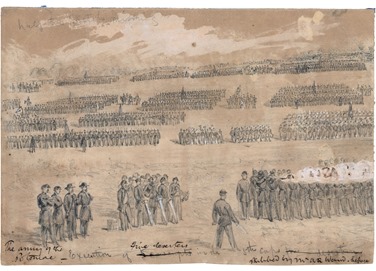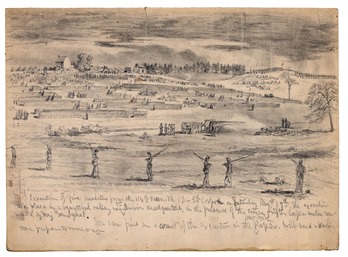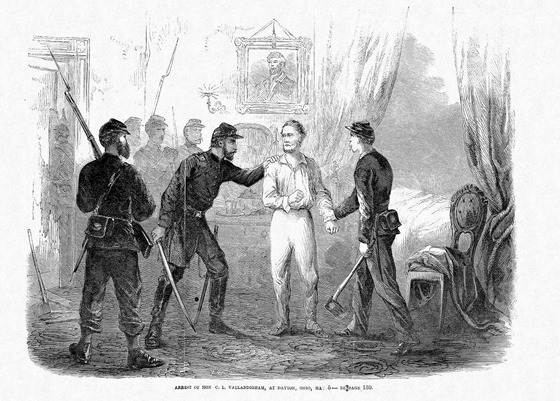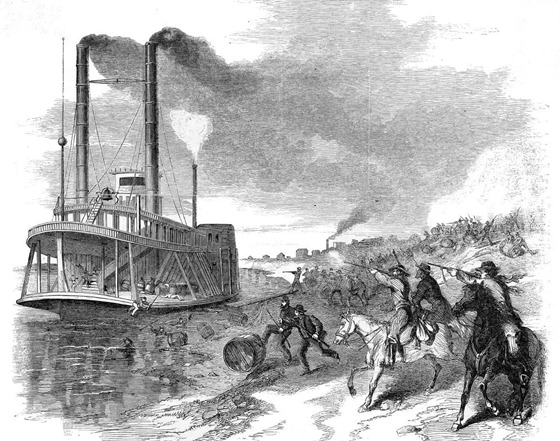(New York Times article.)
HEADQUARTERS ARMY OF THE POTOMAC, SATURDAY, Aug. 29, 1863.
The execution of the substitute-deserters sentenced to the penalty of death in General Orders No. 84, took place to-day. More than ordinary interest was exhibited in this execution of military law, and it is estimated that not less than 25,000 persons were present. The ground was well selected, and every arrangement so complete that no accident occurred to mar the solemnity of the proceedings.
The position of the spectators was upon a semicircular elevation partially surrounding the place of execution. Previous to the execution the scene presented a remarkable view to the spectator.
 Two of the sentenced persons were Protestants, two Catholics, and the fifth a Hebrew. The spiritual advisers of each were present, administering the last consolations of religion. The criminals were sitting upon their respective coffins, with the yawning graves in their rear. The troops were drawn up in close column by division, covering the complete semicircle, and separated from the spectators by a creek.
Two of the sentenced persons were Protestants, two Catholics, and the fifth a Hebrew. The spiritual advisers of each were present, administering the last consolations of religion. The criminals were sitting upon their respective coffins, with the yawning graves in their rear. The troops were drawn up in close column by division, covering the complete semicircle, and separated from the spectators by a creek.
The order for their immediate execution was issued by Gen. GRIFFIN at 3 P.M., and the officer of the day, Capt. CROCKER, of the One Hundred and Eighteenth Pennsylvania, recalled the clergymen from their spiritual duties.
The rest is briefly told.
 At the order to fire, thirty-six muskets were discharged, and instant death was announced by the surgeons in attendance as the result. The bodies were then placed in their respective graves, and the clergy performed the last religious rites over the deceased.
At the order to fire, thirty-six muskets were discharged, and instant death was announced by the surgeons in attendance as the result. The bodies were then placed in their respective graves, and the clergy performed the last religious rites over the deceased.
The spectacle was an unusual one — the Protestant, the Hebrew and the Catholic stood side by side, each uttering prayers for their souls.
The names, ages, residences, etc., of the deceased are as follows:
GEORGE KUHNA, Hanoverian, 22 years old, Pennsylvania — unmarried.
JOHN FELANE, Italian, 26 years old, Pennsylvania — wife and family.
CHARLES WALTER, Prussian, 28 years old — wife and child.
GEORGE KEINESE, Italian, 24 years old — wife and child.
EMIL LAI, Prussian, 30 years old — wife.
The clergy who attended these unfortunates were the Chaplain of the One Hundred and Eighteenth Pennsylvania regiment; Rev. C.L. EGAN, of St. Dominick’s Church Washington; and Rabbi B.S. SCOLD, of Baltimore. They were unremitting in their attendance upon the deceased from the time of their sentence until the final hour.
______
Image information:
Top image:
- Procession for the execution of five deserters from the 118th Pennsylvania Volunteers, 1st Division, 5th Corps, Beverly Ford, Va.; drawn by Edwin Forbes.
- Library of Congress image.
Second image:
- Execution of five deserters in the 5th Corps; drawn by Alfred R. Waud.
- Drawing on brown paper : pencil, Chinese white ; 17.8 x 25.9 cm.
- inscribed below image in pen and pencil: The Army of the Potomac – Execution of 5 conscripts five deserters in the 5th corps for desertion/ [sketched] by Mr A R Waud.
- Inscribed upper left: half this sketch missing.
- Library of Congress image.
Bottom image:
- Execution of five deserters from the 118th Pennsylvania Volunteers, 1st Division, 5th Corps, before the entire 5th Corps, Beverly Ford, Va.; drawn by Edwin Forbes.
- “The fatal volley” on mount.
- Library of Congress image.





